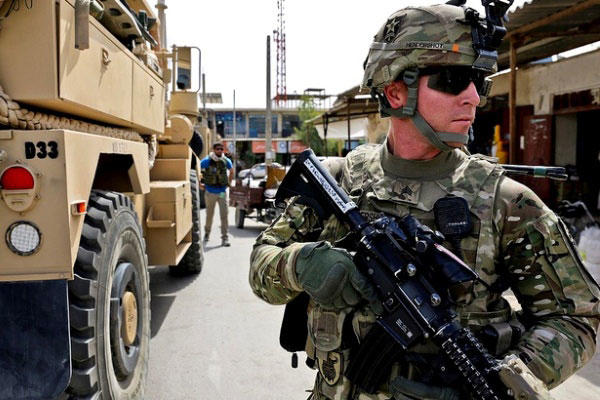The U.S. Army has altered its government-owned Scorpion camouflage pattern to look almost identical to MultiCam, the trademarked pattern the service has been using in Afghanistan since 2010.
Earlier this spring, Army leaders began briefing senior sergeants major around the service that the Universal Camouflage Pattern will be replaced with Scorpion, a pattern similar to MultiCam that was developed around 2002 for the Objective Force Warrior program.
The Army has spent the past five years immersed in testing as part of its camouflage improvement effort to replace the UCP, a pixilated pattern that has proven to be inferior when compared to other patterns.
Army officials wanted to replace UCP with Crye Precision's MultiCam -- a pattern that has demonstrated consistent performance in multiple tests and was selected in 2010 as the Operational Camouflage Pattern, or OCP, for soldiers to wear in Afghanistan. But problems emerged with price negotiations and the Army decided to go with Scorpion, which was actually designed by Crye Precision under a government contract.
The company's owner, Caleb Crye, then improved the pattern, making it more effective and trademarked it as MultiCam.
So since the selection of Scorpion, Army camouflage experts have also decided to improve Scorpion.
The new version, known as Scorpion W2, looks virtually the same as MultiCam or OCP, according to an Army source with knowledge of the program.
This may work to the Army's advantage since the service has spent nearly $3 billion on uniforms and equipment patterned in OCP for Afghanistan, the source said.
Military.com asked the Army about Scorpion W2's similarity to MultiCam on July 16, but Army spokesman William Layer said: "There is no information I can give you at this time."
Despite its selection of Scorpion, Army uniform officials have not stopped buying OCP.
Product Manager Soldier Protective Equipment just put out a July 15 pre-solicitation notice to modify a current contract for the Improved Outer Tactical Vest. The Army wants to buy another 20,000 IOTVs complete with "Generation III (Gen III) IOTV Conversion Kits in the Operation Enduring Freedom Camouflage Pattern," according to the notice.
Crye did not respond to an email request to discuss Scorpion W2. His company, however, does employ a team of lawyers to prevent uniform companies from turning out unlicensed knock-offs of MultiCam.
The Army was poised to announce the results of its multi-year camouflage improvement effort nearly a year ago, but held off when congressional language in the National Defense Authorization Act for Fiscal 2014 called on the Pentagon to put an end to the services branding their ranks with unique camouflage uniforms.
In addition to Crye, the other finalists in the Army's Phase IV camouflage testing included ADS Inc., teamed with Hyperstealth, Inc.; Brookwood Companies Inc.; and Kryptek Inc.
Ironically, in March 2013 the Army decided to drop Scorpion as the fifth finalist because it was too similar to one of the industry submissions, Army officials said.
It is not a surprise to camouflage experts that the Army decided to improve the original Scorpion design. Scorpion has the same colors as MultiCam, but MultiCam has a slightly sharper, slightly darker appearance.
The original Scorpion would fade far faster than MultCam, according to a subject matter expert on MultiCam.
"It's too light; that's why MultiCam exists," he said.
The unique blend of greens, browns and tans that make up MultiCam has been a favorite of Special Operations Command for almost a decade. It emerged as the clear winner over several other patterns in 2010 when the Army selected it for Afghanistan.
Two other Army studies -- one completed in 2009 and the other in 2006, showed that MultiCam outperformed UCP in multiple environments.
-- Matthew Cox can be reached at Matthew.Cox@monster.com.
Don't Miss a Single Military.com Story
To read the full article and get exclusive benefits, sign up today.
It’s FREE
Why am I seeing this? Visit our FAQs




























